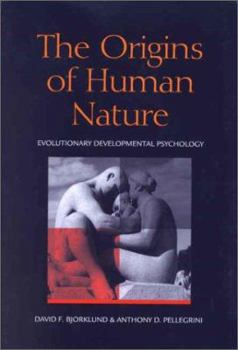The Origins of Human Nature: Evolutionary Developmental Psychology
Select Format
Select Condition 
Book Overview
An attempt to define the field of evolutionary developmental psychology - the application of the principle of natural selection to explain contemporary human development. The authors point out that an... This description may be from another edition of this product.
Format:Hardcover
Language:English
ISBN:1557988781
ISBN13:9781557988782
Release Date:January 2001
Publisher:American Psychological Association (APA)
Length:444 Pages
Weight:1.45 lbs.
Dimensions:1.4" x 7.3" x 10.3"
Customer Reviews
1 rating
A Welcome Addition to the Literature
Published by Thriftbooks.com User , 22 years ago
This book, published under the imprimatur of the American Psychological Association, is meant to be a textbook on human developmental psychology, which is the study of individual development from embryo to adulthood. The idea that there is an intimate link between individual development and species evolution was publicized more than a century ago by Haeckel, who coined the famous phrase "Ontogeny [individual development] recapitulates phylogeny [species development]." However attractive Haeckel's idea, it prove to be far too simple (see the excellent book "Ontogeny and Phylogeny" by S. J. Gould). For most of the 20th Century, developmental psychologists dealing with humans virtually ignored the evolutionary literature. This book is a largely successful attempt to rectify this curious situation.Developmental psychology explains how nature (genes) and nurture (environment) interact in determining individual intelligence, personality, and social behavior. The authors take a thoroughly "developmental systems perspective," in which there is a "bidirectional interaction at all levels of organization" (p. 68) between genes and environment. Since the interaction between genes and culture is in fact highly nonlinear, this perspective is correct, as long as it is not take to the point where we deny the usefulness of heredity estimates (which the authors do not do, though there is virtually no behavioral genetics in the book).The authors expound basic evolutionary psychology, they compare human and animal behavior, and generally suffuse their exposition with an evolutionary dimension. But what exactly is the connection between ontogeny and phylogeny? We are told that much of human behavior is adaptive (e.g. morning sickness in pregnancy), but it is unclear how this affects developmental theory, for which the important question is "is morning sickness good or bad for mother and/or child?" In several cases, they show how developmental psychology can improve evolutionary thinking (e.g., understanding the pace of individual cognitive development, or the relative importance of domain specific vs. domain general cognitive capacities). But the other direction is only weakly represented in the book.The most important principle of evolutionary theory that applies to developmental psychology, according to the authors, is that infants are not tabula rasa, but rather are predisposed to learn and develop in certain directions (e. g., the acquisition of language, recognition of faces, willingness to share, potential for anger and aggression). They apply this nicely to cognitive development, but fall flat when discussion social development and interaction.This is because the evolutionary psychology position on social development is in serious need of updating. The book presents the standard ev psych view that cooperation, altruism, and aggression can be understood in terms of self-interest, inclusive fitness (Hamilton), and reciprocal altruism (Trivers, but attributed






